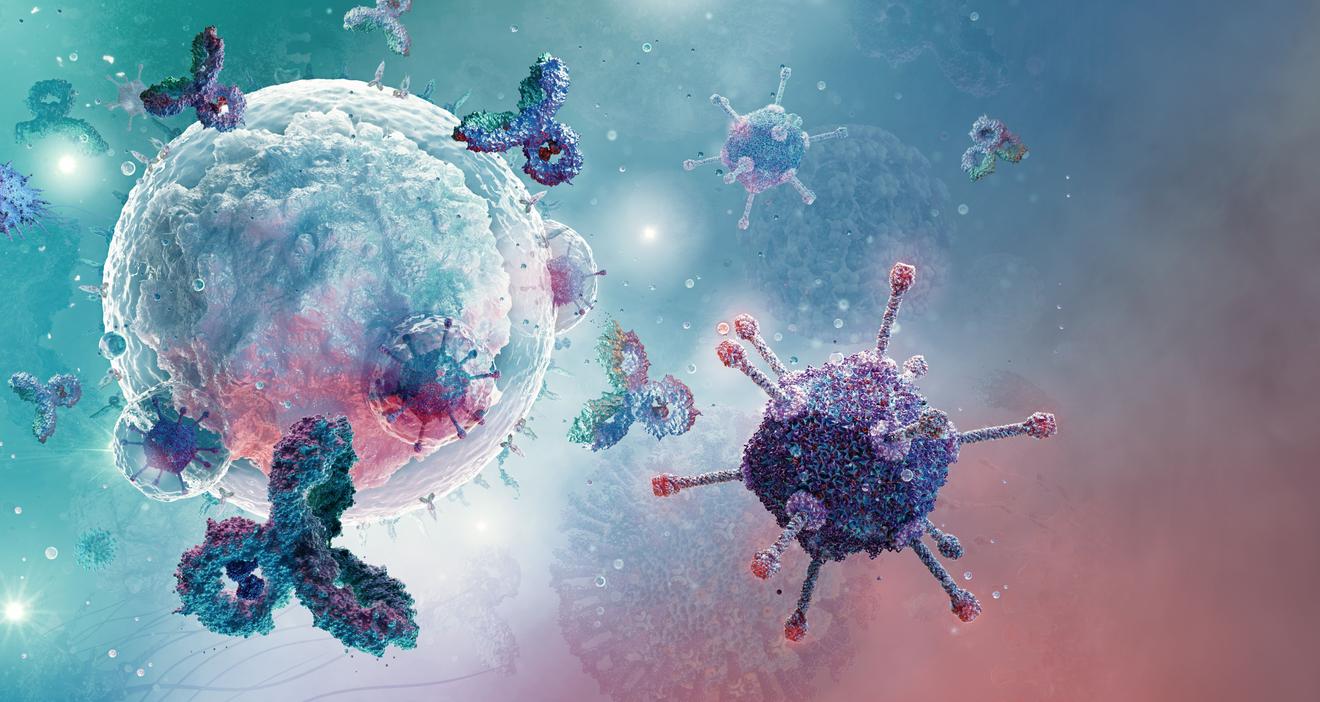Immunotherapy is a powerful way to treat cancer patients but up till now, it was hard to predict why some patients or cancer types do not benefit from this treatment. For some cancers, immunotherapy can be safely integrated into the standard treatment but for others, further research is needed to either alter the immunological environment with cancer vaccines or to develop a new type of immunotherapies that target the tumour in another manner.
Cancer is one of the most common diseases and a leading cause of death worldwide. Although new and efficient therapies are being developed, it is important to know from which treatment a patient will benefit the most. By using biomarkers, oncologists can better understand the specifics of each patient and adapt the treatment to their personal profile. A group of international researchers, under the leadership of Professor Abhishek D. Garg from KU Leuven, studied the immunological environment of five different tumour types, defining biomarkers that predict the patient’s response to immunotherapy.
Is immuuntherapie voor iedereen?
Immuuntherapie is nog een relatief nieuwe therapie maar bleek voor sommige kankerpatiënten al bijzonder krachtig in de bestrijding van kankercellen. Het grote voordeel is dat het immuunsysteem van de patiënt zelf wordt gebruikt waardoor het immuunsysteem ‘een geheugen’ kan opbouwen tegen kankercellen en zo langdurige bescherming kan bewerkstellen. Over het algemeen lijkt immuuntherapie een goede behandeloptie voor verschillende kankerpatiënten maar toch blijkt niet iedereen ermee geholpen te zijn. Al wist men tot nu toe nog niet precies waarom.
Is immunotherapy for everyone?
Immunotherapy is a relatively new therapy but for some cancert patients it has proven to be a very powerful way to treat cancer cells. The huge advantage is that it uses the patient’s own immune system to attack cancer cells. In this way, it can not only destroy the cancer cells anywhere in the body but also help our immune system to build up a memory against cancer cells thereby providing a long-term curative benefit. Thus, immunotherapy is a good treatment option for many cancer patients. However, not every cancer type is sensitive to this treatment, and until now, we didn’t fully understand why.
“It can be dangerous to randomly treat cancer patients with one-size-fits-all immunotherapy”, says Professor Abhishek Garg from the Department of Cellular and Molecular Medicine (KU Leuven). “Pre-selection of patients is necessary to prevent severe side-effects from wrongly administered immunotherapy and/or, unnecessary delay in providing other more accurate therapeutic interventions. Therefore, we need biomarkers to predict which kind of immunotherapy is a suitable treatment for a particular patient or cancer type.”
The researchers investigated the immunological environment of different tumours and distinguished two different classes. In one class (consisting of melanoma, bladder cancer, and lung cancer), the immunogenic environment displayed typical signs of being supportive for immunotherapy, and accordingly, most of these patients showed a positive response to this treatment. On the contrary, the second class [consisting of glioblastoma (brain cancer) and ovarian cancer] showed an immunotherapy non-supportive environment with signs of hostility toward anti-cancer immune structures. By harmonizing the environmental features of this second class of tumors with patient data and response to immunotherapy, this study could identify markers of T cell ‘fitness’ – a specific type of immune cell that is critical for immunotherapy response – that clarified the failure of immunotherapy in these particular patients. “Especially in glioblastoma, the researcers identified that T cells were in such a bad state that they were not likely to respond to current antibody-based immunotherapies.
By better defining non-respondents, we can develop a more targeted therapy. Prof. dr. Oliver Bechter
Prof. dr. Oliver Bechter
Prof. dr. Oliver Bechter, specialist general medical oncology at UZ Leuven and involved in the trial: "Immunotherapy is indeed not for everyone. Meanwhile, we have been able define the group patients that do not respond well to the treatment ('respondents') fairly clearly: we know which of their immunofactorsof contribute to the success of the treatment. But if people do not, or not sufficiently, respond ('non-respondents') there can be various reasons. This has to do with the large variability of mechanisms that prevent a response to immunotherapy. Once we can better define the patient population that does not respond to the therapy, it will also be possible to develop a more targeted therapy for this population. This is already partly being done in various phase 1 trials at UZ Leuven."
Implementation as standard treatment
Currently, antibody-based immunotherapy is part of the standard treatment for, melanoma, lung cancer, and bladder cancer, amongst others. This research showed that other cancer types like ovarian cancer and glioblastoma do not benefit and need a different type of immunotherapy or could benefit from the use of anticancer vaccines that can improve the fitness of T cells in these hostile tumor environments and perhaps make them sensitive to the current immunotherapy.
“Further research is needed to better understand how an anticancer vaccine can be used in these patients and how to combine it with current immunotherapy or chemotherapy”, concludes Professor Garg. “This study is already a huge step forward in defining the right biomarkers to predict a patient’s or cancer type’s response to current immunotherapy. We are now working closely with oncologists at UZ Leuven to start new clinical trials and implement it in the daily practice of a hospital.”
More information
The study “Multi-omics and spatial mapping characterizes human CD8+T cell states in cancer” by Naulaerts et al. was published in Science Translational Medicine (doi: 10.1126/scitranslmed.add1016).
This research was conducted with several international partners: KU Leuven, UZ Leuven, UC Louvain, Heinrich Heine University Hospital, IsoPlexis Corporation, The Babraham Institute, Leiden University Medical Center and funded by Research Foundation Flanders (FWO), FWO-FNRS Excellence of Science (EOS) ‘DECODE’ consortium, KU Leuven, Kom op Tegen Kanker (KOTK), and Leuven Cancer Institute (LKI).
